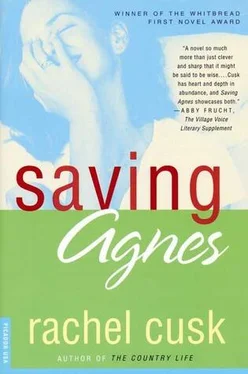The first time she had attempted the strenuous hike through the congested hills and vales of north London, it had not been through choice. She had arrived at the bus stop to find her purse empty of change, and with the uncertain logic of such trying moments had decided she could as easily walk the three or four arduous miles homes as the two hundred yards up the high street to the nearest bank. It had taken her over an hour, and she had arrived weary but exhilarated, to find the house dark and silent. The others had apparently gone to bed, and as she made a solitary cup of tea in the kitchen and carried it upstairs she realised this state of affairs was rather pleasant. The part of the day in which one had to field questions and explain oneself now seemed to her the most arduous. She drifted around her darkened room for a while like an intruder, touching things. The next morning she got up early and left for work before the others were awake.
Agnes had never been one for being alone. She had always felt herself becoming blurred around the edges after an hour or two and had gone to seek more stimulating company. Now she began rather to enjoy the sensation of encroaching invisibility. It became something of a challenge. How long could she go without calling on her friends for support? Would they worry, wondering what had happened to her? Would she become mysterious and desirable with absence, returning to find herself somehow nicer, her life enhanced? In the old days the house had been her nerve-centre, for as well as providing the solaces of friendship it had been a hub of news: phone calls, letters, unexpected callers, all of the things which pumped her heart like a life-support machine emanated from home. The fact that now she dreaded its quiet telephone and reminders of bills unpaid did to some extent facilitate her protracted absences.
She walked down into East Finchley, under the railway bridge, and on towards Highgate. The winter darkness was sharp and clear, but the streetlamp turned the sky a muddy brown. Her feet pounded on the pavement. Her breath came out in misty dragonish puffs. The rhythm was almost mechanical. She liked the way her mind emptied of nebulous worrying thoughts when she was walking, and housed instead a set of honed perceptions. She had little experience of such intentness.
As she approached Highgate she stopped at one of the garish late-night garages, which hummed and glowed incongruously by the roadside like spaceships, to buy some chocolate. Normally Agnes would never have eaten such a thing, let alone in the street, but her midnight perambulations had begun to lend her a certain immunity to the common gaze. Initially she had been troubled by the stares of occasional passers-by on the lonely pavements, especially the men, who looked at her first as if wondering what she was doing out alone so late at night, and then away, perhaps frightened of the implications, already seeing themselves accused. She wondered if they sensed her fear of them and were ashamed. Later, when habit had dissolved her fear of strangers, she thought it was they who were afraid. She knew how she must look: peripatetic, unwanted, a mad glint in her eye. It was almost enjoyable.
She passed through Highgate village and began to walk down the long hill to Archway. Buses lit up like moving blocks of flats whooshed past her. A car sped by, its horn blaring, arms waving from the windows like streamers. Her heart pounded with surprise. A film of sweat sprang up beneath her clothes. She took out her bar of chocolate and began to unwrap it with shaking hands. Only a moment before she had felt immune, her identity a faint question mark over her head. Now she wondered what on earth she was doing at this sordid roundabout, when it was so late and cold that any normal person would have longed to be home. Suddenly she too longed to be home. A delayed flame of pain shot through her, illuminating her in the darkness. She tried to cross the road and was met with a barrage of horns.
Finally she reached the Holloway Road. She took a piece of chocolate and put it in her mouth just as a man walked past her on the pavement.
‘You’ll get fat,’ he said. His face was concerned.
‘Just — just piss off!’ Agnes shrieked as she hurried away.
By the time she reached Drayton Park she was almost running. She crammed more chocolate in her mouth, but her breath seemed unfortunately to collide with it on its way out and she began to choke.
‘Hey!’ someone shouted from across the road. ‘Hey, you!’
She quickened her pace with terror. She could hear footsteps behind her.
‘Good God, Agnes,’ said Merlin, overtaking her and then stopping in her path. ‘What on earth are you doing?’
‘I–I don’t know,’ replied she between coughs and gasps. ‘Someone was shouting. I was scared.’
‘Oh, that was me. I was only joking. Hey, you’ve got chocolate all over your mouth.’
They walked back to Elwood Street. Agnes wiped her mouth surreptitiously on her sleeve.
‘Do you fancy a drink?’ said Merlin when they got in. ‘We could go to that pub on the Blackstock Road. We could have a chat.’
It was a long time, Agnes realised, since she had been out. She went upstairs to change into other clothes. She wondered what Merlin wanted to talk to her about.
She and John had always used to argue when they went out. It was something to do with the ritual of spending money on formalised pleasure — it begged to be despoiled. Once, in a restaurant, he had spied a female friend on the other side of the room and had gone to stand at her table like a suitor, talking and waving his arms animatedly. Their food had come and still he did not return. Agnes had tried vainly to catch his eye but he hadn’t looked at her. She didn’t dare to go over there herself and drag him back to the table. She had waited for over half an hour in a sweat of embarrassment and jealousy, ridiculous and alone at a table laden with food, like a mad old divorcée. Eventually she had begun to cry. When he returned to find her like that he had been disgusted and had left the restaurant, flinging a ten-pound note down on the table.
She took off her clothes and chose different ones, but was distressed to find that they would not fit her. She had put on weight. She climbed back into the first outfit. Merlin called up the stairs to her. She fumbled with a lipstick, sweating with panic.
‘I feel like I haven’t seen you for ages,’ said Merlin when they were ensconced in a velveteen booth. The table before them was scattered with unused beer mats, beside which crisps floated soggily in dark liquid circles. ‘You’ve got a secret life. You never come home any more.’
‘Overtime,’ said Agnes. It sounded more like a comforting hot drink than a spiritual struggle.
‘Really?’
Merlin regarded her with grinning amazement. She stared back at him, and was disconcerted at her sense of having never really looked at him before. He had new glasses.
‘You’ve got new glasses,’ she said.
‘What?’ He looked bemused. ‘Oh, these. No, I’ve had them for ages. Come on, Ag, don’t change the subject. Tell me about your secret life.’ He peered at her suspiciously. ‘What are you up to?’
‘Nothing.’
‘Oh.’ He seemed disappointed. ‘So why don’t you ever come home?’
‘I told you. Overtime.’
‘Oh. I thought you were joking.’
‘Well, what did you expect me to say? I’m having some affair that I can’t tell you about?’
‘I’ll admit I was thinking along those lines.’
‘God, well, I’m sorry I can’t give you anything as exciting as a man to talk about. It’s just my boring old job.’ A gorge of anger rose up into her throat. ‘Maybe you’d like to find someone more desirable to have a drink with, Merlin. I mean, God forbid that I should dare to talk about my boring old life. I probably shouldn’t be out, should I? I should be in purdah. I should ring a bell and shout “single”!’
Читать дальше












